Quarterly Report FY 2024, Quarter 4
July 1, 2024 – September 30, 2024
Prepared for
Mental Health Advisory Council (MHAC) Meeting on November 20, 2024
Indiana Protection and Advocacy Services (IPAS) Commission Meeting on November 22, 2024
IDR's Mission: To uphold, promote, and advance the rights of individuals with disabilities
through empowerment and advocacy to achieve a more equitable society.
Table of Contents
- New Format
- Executive Director's Highlights
- Diversity, Equity, and Inclusion Report
- Client Demographics
- Data at a Glance
- Team Updates
- Supplemental Information
New Format
The purpose of the quarterly report is to present vital information and updates to IPAS Commission members, MHAC members, employees, clients, and the public. The change in the format of this report to a web-based version has been made in response to feedback received from Commission and Council members. This format is designed to be more accessible, searchable, and easier to navigate. The layout of information has also changed, to promote transparency, bring attention to the progress being made on systemic issues, and demonstrate the impact of IDR's work for Hoosiers with disabilities.
The clickable buttons at the top of this page provide information needed to better understand this report.
- “P&Os” leads to the Priorities & Objectives, which drive the work of IDR. The P&Os outline the issues that people with disabilities, including those who are multiply marginalized, would like IDR to address.
- “Success Stories” leads to a page dedicated to sharing the stories of IDR clients.
- “Work Groups” leads to a page lists the organizations, committees and councils IDR employees are a part of.
- “Acronyms” are used throughout this report, and the "commonly used acronyms" button leads to an up-to-date list of acronym meanings.
To return to this report, use your browser's "Back" button.
Executive Director's Highlight
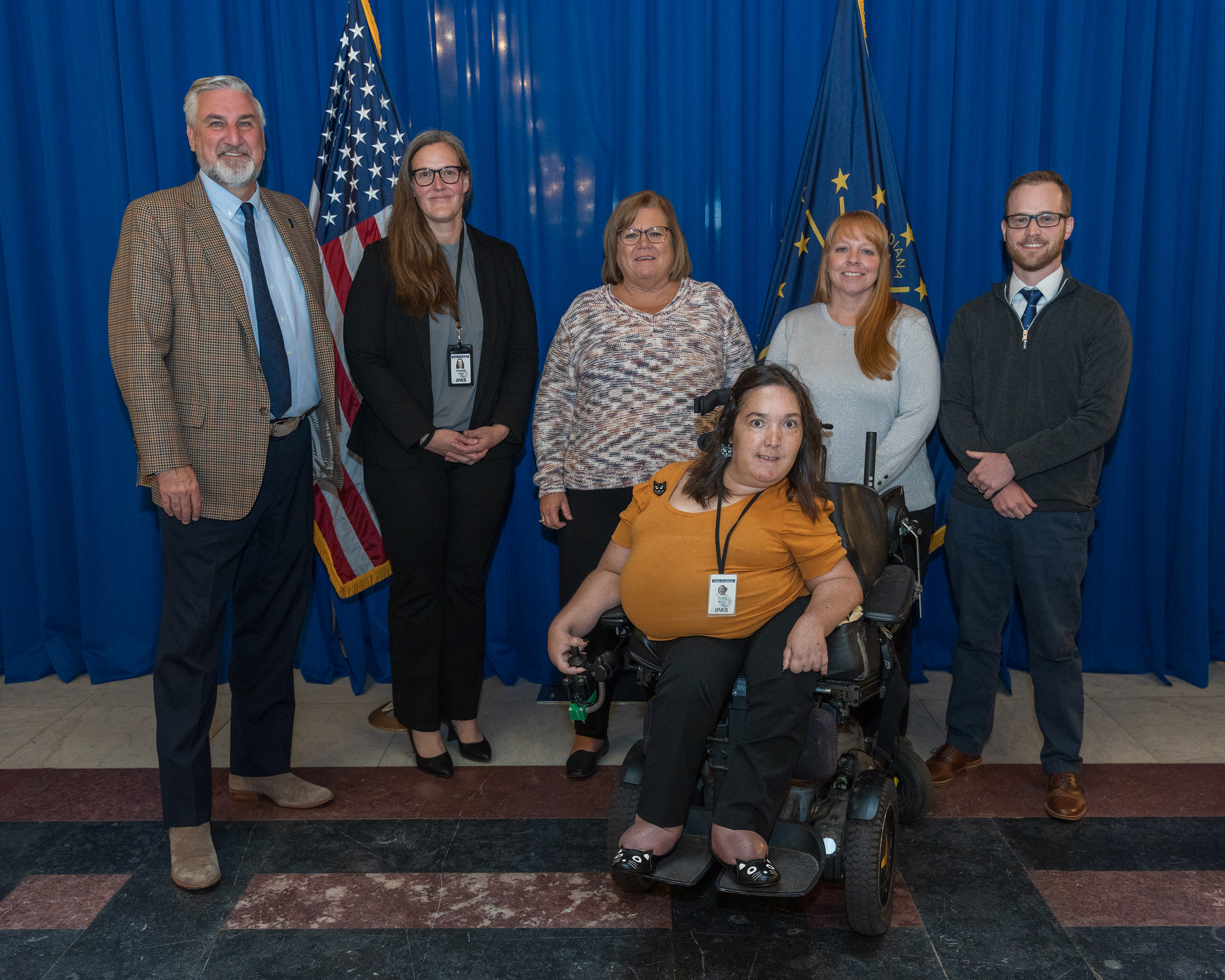 The Investigations Team has received the 2024 Governor’s Public Service Achievement Award for the PSF project. Congratulations to Tash Crespo, Christian Ewoldt, Tina Frayer, Natasha Henry, and Emily Munson! This project showcases the team’s commitment to ensuring children living in private secure facilities are educated about their rights and that the facilities provide a safe and therapeutic environment. The team’s work with DCS not only resulted in improved conditions in the facilities, but the strong partnership will help ensure the ongoing safety and well-being of the children placed in those facilities.
The Investigations Team has received the 2024 Governor’s Public Service Achievement Award for the PSF project. Congratulations to Tash Crespo, Christian Ewoldt, Tina Frayer, Natasha Henry, and Emily Munson! This project showcases the team’s commitment to ensuring children living in private secure facilities are educated about their rights and that the facilities provide a safe and therapeutic environment. The team’s work with DCS not only resulted in improved conditions in the facilities, but the strong partnership will help ensure the ongoing safety and well-being of the children placed in those facilities.
This project also led to the development of the “Know Your Rights” coloring book, an innovative resource that explains to children through coloring pages and accessible language, what their rights are in a facility and what to do if they believe their rights are being violated. This book was presented to the National Disability Rights Network (NDRN), our national technical assistance organization, and has since been adopted for modification by at least twenty other states and territories. DCS has also printed 1,000 copies of the book to provide to children in their care placed in these facilities. Finally, the results of this investigation were shared with policymakers at the national level, highlighting Indiana's commitment to its most vulnerable citizens.
At right: Governor Eric Holcomb and Executive Director Melissa Keyes stand with the winning Investigations team members, (from l-r) Tina Frayer, Natasha Henry, Christian Ewoldt, and (seated in front) Emily Munson. Not pictured is Tash Crespo.
- IDR welcomed Gabby Clarke and Logan McCullough to our team this quarter. Gabby serves as a litigation paralegal and Logan works as an advocate on the employment team. IDR is currently seeking a Legal Director and 2025 Disability Law Fellow. We will also be hiring summer interns through the Governor’s Summer Internship program.
- IDR’s Executive Director was appointed to the Indiana State Bar Association Board of Governors, the NDRN Board of Directors, and as an Advisor to the American Bar Association Center on Law and Aging.
Diversity, Equity, and Inclusion Report
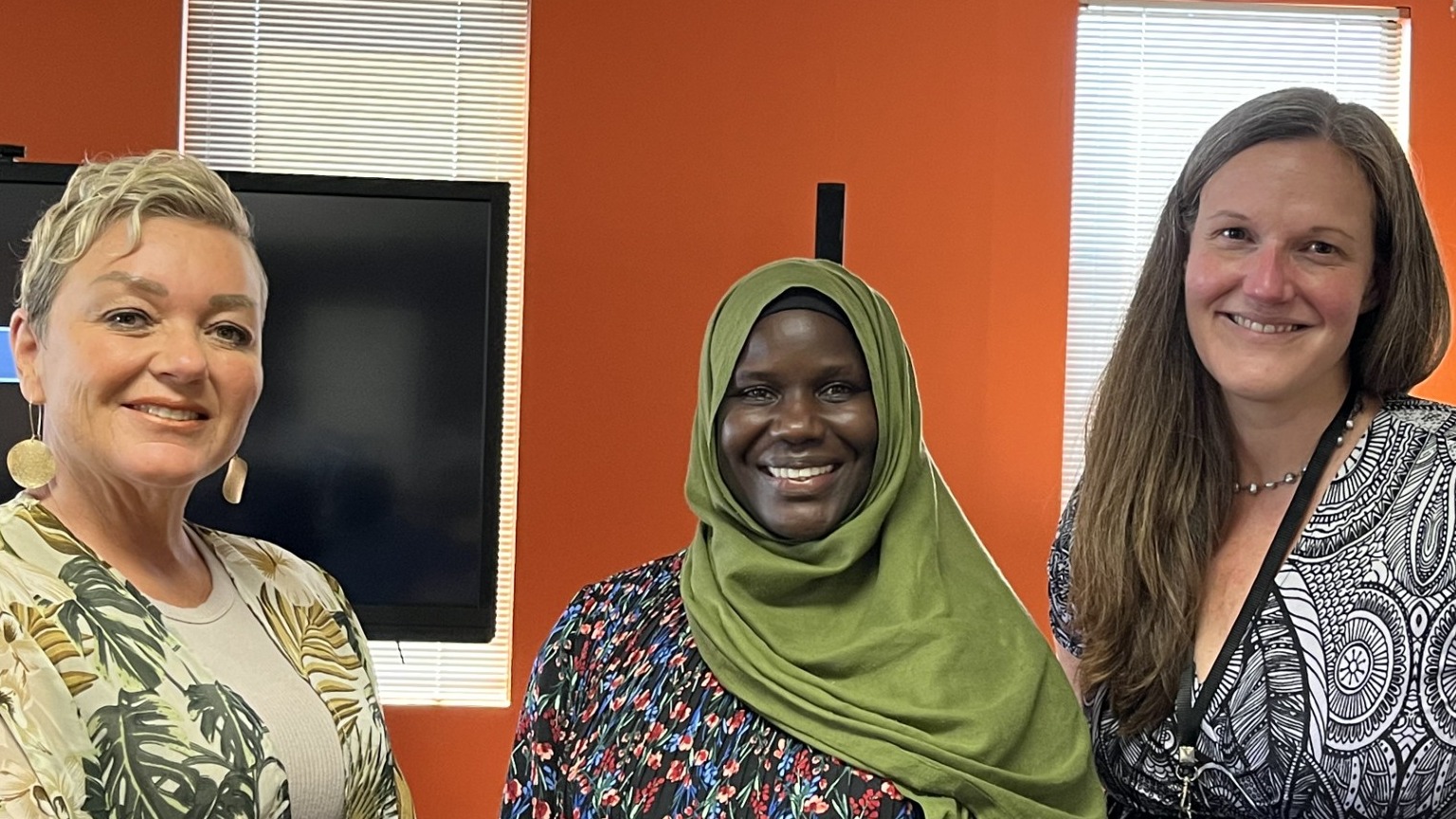 GOAL 1: IDR will provide services to more people with disabilities from black, indigenous, and communities of color.
GOAL 1: IDR will provide services to more people with disabilities from black, indigenous, and communities of color.
During the IDR Staff retreat, a full day training was provided by the Peace Learning Center. The goal of this training was to build relationships through greater value of diverse identities. Facilitator, Mame Keita, addressed self-awareness, positive communication, and practical conflict resolution strategies. Staff members were engaged throughout the session, and gave consistent feedback that using these strategies would have positive impact on team culture and client interactions.
At left, from left to right: Advocate Supervisor, Amy Jarrett; PLC facilitator, Mame Keita; and Executive Director, Melissa Keyes.
GOAL 2: IDR staff, the IPAS Commission, and MHAC membership will reflect the broad diversity of Indiana.
- IDR conducted a demographics survey of current staff, IPAS Commission, and Mental Health Advisory Council members. The anonymized results are below.
| Group Name | Total Group Members | Identify as Having a Disability | Identify as BIPOC | Identify as Hispanic, Latino, or of Spanish Ethnicity |
|---|---|---|---|---|
| IDR Staff | 29 | 9 | 8 | 4 |
| IPAS Commission | 6 | 2 | 2 | |
| Mental Health Advisory Council (MHAC) | 6 | 4 |
Figure 1 - Staff, IPAS Commission, and MHAC Demographics
- Sam Adams attended IU McKinney School of Law’s Externship Fair, where he explained IDR’s work to students, and shared information about the upcoming Disability Law Fellow opportunity.
GOAL 3: IDR will strengthen its relationships with advocates and organizations led by people with disabilities, people from marginalized communities, and people with lived experiences.
- Nine IDR staff members attended the Self-Advocates of Indiana annual picnic. As a result of attending the event, IDR was asked to provide a presentation on strategies for obtaining competitive integrated employment (CIE) to sheltered workshop participants. The presentation, given by Tash Crespo, was broadcast to over 150 people at three sheltered workshops. The voting section contains more outcomes from the SAI Picnic.
- This quarter, IDR’s Executive Director met with thirteen individuals, organizations or entities including nine that are or are led by people with disabilities or people from marginalized communities. The purpose of these meetings is to start building meaningful relationships and look for opportunities for collaboration.
Client Demographics
Hispanic Ethnicity Demographics
| Q1 Count | Q1 Percent | Q2 Count | Q2 Percent | Q3 Count | Q3 Percent | Q4 Count | Q4 Percent | Total Count | Total Percent | |
|---|---|---|---|---|---|---|---|---|---|---|
| Hispanic | 5 | 2% | 5 | 3% | 9 | 4% | 4 | 2% | 23 | 3% |
| Not Hispanic | 203 | 97% | 156 | 96% | 207 | 95% | 215 | 97% | 781 | 96% |
| Unknown | 1 | 0% | 2 | 1% | 2 | 1% | 2 | 1% | 7 | 1% |
| Total | 209 | 163 | 218 | 221 | 811 |
Figure 2 - Client Hispanic Ethnicity Demographics
Gender/Sex Demographics
| Q1 Count | Q1 Percent | Q2 Count | Q2 Percent | Q3 Count | Q3 Percent | Q4 Count | Q4 Percent | Total Count | Total Percent | |
|---|---|---|---|---|---|---|---|---|---|---|
| Female | 79 | 38% | 55 | 34% | 84 | 39% | 78 | 35% | 296 | 36% |
| Male | 129 | 62% | 104 | 64% | 130 | 60% | 139 | 63% | 502 | 62% |
| Other | 0% | 0% | 0% | 0% | 0% | |||||
| Unknown | 0% | 0% | 0% | 0% | 0% | |||||
| Blank | 1 | 0% | 4 | 2% | 4 | 2% | 4 | 2% | 13 | 2% |
| Total | 209 | 163 | 218 | 221 | 811 |
Figure 3 - Client Gender/Sex Demographics
Race Demographics
| Q1 Count | Q1 Percent | Q2 Count | Q2 Percent | Q3 Count | Q3 Percent | Q4 Count | Q4 Percent | Total Count | Total Percent | |
|---|---|---|---|---|---|---|---|---|---|---|
| Asian | 1 | 0% | 1 | 1% | 2 | 1% | 3 | 1% | 7 | 1% |
| Black/African American | 28 | 13% | 27 | 17% | 31 | 14% | 34 | 15% | 120 | 15% |
| Race Unknown / Declined | 1 | 0% | 1 | 1% | 1 | 0% | 1 | 0% | 4 | 0% |
| White | 167 | 80% | 120 | 74% | 168 | 77% | 168 | 76% | 623 | 77% |
| Blank | 1 | 0% | 4 | 2% | 4 | 2% | 4 | 2% | 13 | 2% |
| Two or More Races | 11 | 5% | 9 | 6% | 11 | 5% | 9 | 4% | 40 | 5% |
| Native Hawaiian/Other Pacific | 0% | 1 | 1% | 1 | 0% | 2 | 1% | 4 | 0% | |
| American Indian/Alaskan Native/ Indigenous | 0% | 0% | 0% | 0% | 0% | |||||
| Total | 209 | 163 | 218 | 221 | 811 |
Figure 4 - Client Race Demographics
Age Demographics
| Q1 Count | Q1 Percent | Q2 Count | Q2 Percent | Q3 Count | Q3 Percent | Q4 Count | Q4 Percent | Total Count | Total Percent | |
|---|---|---|---|---|---|---|---|---|---|---|
| 1 to 3 | 1 | 0% | 1 | 1% | 2 | 1% | 2 | 1% | 6 | 1% |
| 4 to 10 | 13 | 6% | 12 | 7% | 19 | 9% | 21 | 10% | 65 | 8% |
| 11 to 21 | 37 | 18% | 31 | 19% | 44 | 20% | 45 | 20% | 157 | 19% |
| 22 to 40 | 64 | 31% | 44 | 27% | 58 | 27% | 59 | 27% | 225 | 28% |
| 41 to 65 | 77 | 37% | 60 | 37% | 81 | 37% | 79 | 36% | 297 | 37% |
| 66 to 80 | 12 | 6% | 9 | 6% | 9 | 4% | 10 | 5% | 40 | 5% |
| 81 and above | 4 | 2% | 4 | 2% | 2 | 1% | 2 | 1% | 12 | 1% |
| Blank | 1 | 0% | 2 | 1% | 3 | 1% | 3 | 1% | 9 | 1% |
| Data errors | 0% | 0% | 0% | 0% | 0% | |||||
| Total | 209 | 163 | 218 | 221 | 811 |
Figure 5 - Client Age Demographics
Data at a Glance
Intake Requests / Information & Referrals
| Intake Requests / I&Rs FY 2024 | Q1 | Q2 | Q3 | Q4 | Total |
|---|---|---|---|---|---|
| Intake Requests | 693 | 732 | 636 | 649 | 2710 |
| Information and Referrals | 195 | 172 | 170 | 132 | 669 |
Figure 8 - Intake Requests / Information & Referrals
Figure 9 -Graph of Intake Requests / Information & Referrals FY 2024
Individual Advocacy Cases by Team
| Individual Advocacy in FY 2024 | Q1 Opened | Q1 Closed | Q2 Opened | Q2 Closed | Q3 Opened | Q3 Closed | Q4 Opened | Q4 Closed | YTD Open | YTD Closed |
|---|---|---|---|---|---|---|---|---|---|---|
| Abuse, Neglect, Discharge | 9 | 10 | 6 | 10 | 8 | 9 | 6 | 6 | 29 | 35 |
| Civil Rights | 14 | 9 | 2 | 13 | 6 | 12 | 11 | 5 | 33 | 39 |
| Education | 19 | 4 | 10 | 11 | 17 | 7 | 11 | 21 | 57 | 43 |
| Employment | 10 | 12 | 9 | 6 | 13 | 13 | 11 | 12 | 43 | 43 |
| Health Care | 2 | 9 | 1 | 1 | 5 | 2 | 6 | 3 | 14 | 15 |
| Self-Determination | 6 | 3 | 8 | 16 | 9 | 2 | 7 | 9 | 30 | 30 |
| TOTAL | 60 | 47 | 36 | 57 | 58 | 45 | 52 | 56 | 206 | 205 |
Figure 10 - Individual Advocacy Cases Opened & Closed by Quarter FY 2024
Figure 11 - Graph of Individual Cases Opened by Team FY 2024
Figure 12 - Graph of Individual Cases Closed by Team FY 2024
Team Updates
Abuse, Neglect, & Discharge
Abuse, Neglect, & Discharge Facility Monitoring & Investigations FY 2024
| Facility Monitoring and Investigations FY 2024 | Q1 | Q2 | Q3 | Q4 | Total |
|---|---|---|---|---|---|
| Facilities Visited | 7 | 6 | 4 | 1 | 18 |
| Reports filed with overseeing entities | 2 | 2 | 1 | 5 | |
| Discharges assisted | 11 | 1 | 12 |
Figure 13 - Facility Monitoring & Investigations FY 2024
Investigations FY 2024
| FY2024 Investigations *** | Q1 Opened | Q1 Closed | Q2 Opened | Q2 Closed | Q3 Opened | Q3 Closed | Q4 Opened | Q4 Closed | Total Opened | Total closed |
|---|---|---|---|---|---|---|---|---|---|---|
| Death of a Patient | 1 | 1 | 2 | 1 | 3 | |||||
| Environmental & Facility Safety | 1 | 1 | ||||||||
| Neglect | 2 | 1 | 1 | 1 | 1 | 3 | 3 | |||
| Physical Abuse | 1 | 1 | 1 | 2 | 1 | 2 | 4 | |||
| Sexual Abuse | 1 | 1 | ||||||||
| Total | 3 | 2 | 1 | 3 | 1 | 2 | 2 | 4 | 7 | 11 |
Figure 14 - Investigations FY 2024
***In FY 2024, there were no calls for investigation in the following categories: client-to-client abuse, medication error, unnecessary restraint, or other abuse.
Figure 15 - Graph of Investigations Opened in FY 2024
Figure 16 - Graph of Investigations Closed in FY 2024
- Outcomes
- As a result of IDR's visit in Quarter 4, a facility was placed on probation, and an admission hold was extended through the end of the quarter.
- Investigated potential discharge issues in specialized long-term care facilities.
- IDR reviewed 112 serious occurrence reports from five facilities this quarter. No cases were opened as a result of these reports.
- Work groups
- Tina Frayer worked with IN-CASE on exploitation of the elderly and people with disabilities.
- Christian Ewoldt was part of the Juvenile Detention Alternatives Initiative (JDAI) project to review the Marion County Juvenile Detention Facility. The group received training, reviewed policies and practices of the detention facility, and conducted an on-site evaluation of the program. This was the first invitation IDR has received to participate with JDAI. IDR benefitted by receiving a copy of the JDAI standards which will be helpful in future investigations and monitoring.
- Community Connections
- TIna Frayer presented to GCPD interns regarding IDR services and our work with incarcerated individuals. This presentation resulted in a connection with the Department of Corrections ADA Coordinator.
Monitoring
- Outcomes
- IDR Conducted 33 monitoring visits at ten facilities in Q4.
- The CRMNF Marion facility closed in January 2024. In Q4, IDR staff conducted follow up interviews with former residents/guardians and learned that of the nine individuals last discharged, two are currently incarcerated, eight have been hospitalized for mental health stabilization, one has moved to a more secure setting, and one has moved to a new home.
- For years, IDR staff has checked in with “Willa,” a state hospital patient. During this quarter, Willa expressed that she’d like to get outside more. IDR staff talked with hospital administrators, who are now working with nursing staff on a plan for the patient to safely visit the courtyard during her reintegration time, as the time outdoors would be therapeutic for her. IDR staff will continue to check in with both the patient and hospital staff to monitor the situation.
Rep Payee
- IDR started 36 new cases, had 21 cases in progress, and completed 28 cases this quarter.
Figure 17 - Graph of Rep Payee Cases for FY 2024, Quarter 4
Civil Rights
- Policy Advocacy
- Public Comments - IDR submitted public comments in response to the BMV’s proposed regulatory amendment about driver test administration. Specifically, IDR noted concern that drivers will automatically fail the test if they fail to keep two hands on the steering wheel at all times. The BMV answered IDR’s comments by noting that driver test administrators must grant drivers with disabilities reasonable accommodations pursuant to the ADA.
- Success Stories
- “Whitley,” a college student at Ivy Tech, contacted IDR when the school refused to provide reasonable accommodations, by not allowing her to make up work missed due to her disability. IDR staff helped Whitley resubmit an accommodation request, and later attended a meeting with Whitley, where all parties came to a satisfactory agreement granting Whitley’s needed accommodations.
- Educate - IDR published two educational resources about rights regarding assistance animals. The resources explain the differences between service animals and emotional support animals and describe when Hoosiers with disabilities can access facilities with them.
- Work Groups - Mental Health, Addictions, and Criminal Justice Collaborations Working Group
- Indiana Advisory Committee to the US Commission on Civil Rights – IDR's Executive Director has served as a member of this committee. This quarter, the Committee held hearings on hate crime legislation in Indiana. Because of IDR’s participation, the disability community was centered as a topic of discussion and a panelist specifically focusing on hate crime and the disability community testified.
Litigation
- Systemic Litigation
- Indiana Protection and Advocacy Services Commission, et al. v. Indiana Family and Social Services Administration, et al. (1:24-cv-833-TWP-TAB; U.S. District Court, Southern District of Indiana)
This lawsuit was filed on behalf of children with complex medical needs who are on the Health and Wellness Waiver (formerly known as the Aged and Disabled Waiver) and two individual children, alleging that FSSA failed to provide necessary medical services in the home/community, and that FSSA’s decision to end the ability of parents/guardians to provide paid attendant care services to such children violated children’s rights under the Medicaid statutes and placed children at serious risk of institutionalization, in violation of the Americans with Disabilities Act, as interpreted by Olmstead. Individual plaintiffs have filed a motion for preliminary injunction, which is being briefed. The district court granted a preliminary injunction to the individual children, requiring FSSA to (1) undertake efforts to find in-home nursing services for the children; (2) report on its efforts to find in-home nursing services; and (3) allow the children’s mothers to continue providing paid attendant care services until in-home nursing services are secured. An appeal has been filed with the Seventh Circuit concerning the grant of the preliminary injunction, and briefing is underway.
- Indiana Protection and Advocacy Services Commission, et al. v. Indiana Family and Social Services Administration, et al. (1:24-cv-833-TWP-TAB; U.S. District Court, Southern District of Indiana)
- Individual Litigation
- Jason Grabarczyk and Annette Young v. Town of Edinburgh, Indiana (1:24-cv-847-JRS-TAB; U.S. District Court, Southern District of Indiana)
This lawsuit was filed on behalf of an Edinburgh resident who has intellectual/developmental disabilities and his caretaker/housemate under the Fair Housing Act challenging Town’s failure to allow the individual to keep chickens at home for therapeutic purposes. The parties are engaging in discovery.
- Jason Grabarczyk and Annette Young v. Town of Edinburgh, Indiana (1:24-cv-847-JRS-TAB; U.S. District Court, Southern District of Indiana)
Education
- Success Stories
- "Wallace" was being frequently suspended due to behaviors that result from his disabilities. IDR advocated with Wallace's family, and the school agreed to do a reevaluation, develop a new Functional Behavior Assessment (FBA), add several accommodations, and offer new coping strategies to Wallace. These changes have helped Wallace to be more successful at school, eliminating suspensions.
- "Wesley," a high school student, was suspended from school over 20 days. While he had a 504 Plan, Wesley was never evaluated for an IEP. With IDR's advocacy, Wesley now has an IEP with appropriate accommodations and services and is back to a full day school schedule.
- "Walker" was only receiving 1.5 hours of instruction per school day. Thanks to IDR's persistent advocacy, and several Case Conferences, Walker is now back to attending school full time, receiving appropriate accommodations and services to help him be successful.
- "William," an elementary school student, was receiving services in a self-contained setting. IDR advocated for William to receive instruction in a less restrictive environment, and he is now receiving math, reading and language arts instruction with his peers in the general education environment and receiving paraprofessional support throughout his school day.
Employment
- Monitor
- DRS Employment Systems Transformation Plan – IDR, CPR, and DRS continued to meet monthly to discuss implementation of DDRS’s Employment Systems Transformation Plan. Topics included strategies to promote the exploration of competitive integrated employment rather than default enrollment in day programming, as well as VR outreach about competitive integrated employment to individuals currently participating in sheltered employment.
- Press
- Emily Munson met with a journalist at “The Hechinger Report” to discuss systemic issues experienced by VR participants.
- Work Group
- ICAPI – Emily Munson wrapped up her participation in an Indiana Community Action Poverty Institute project regarding the Social Security Administration’s benefit application process, providing feedback on Project Leader Ashley Phillips’ draft report. That report, “Live in Our Shoes for a Day: A Study of Hoosiers Leaving the Workforce Due to Disability,” was released in September.
- Success Stories
- "Walt" asked IDR for help with VR, who was not supportive of his employment goal because they refused to support the necessary post-secondary education required. IDR reviewed the facts and met with Walt and VR. Thanks to IDR's advocacy, VR is now supporting Walt's education goal which will help him reach his employment goal.
- "Wendy" contacted IDR when she was denied a reasonable accommodation at work, and subsequently fired. IDR conducted fact finding, and asked the employer to give Wendy reasonable accommodation, back pay, and attorney’s fees. Both parties reached a settlement agreement.
- “Wyndell” had a heart attack, and was released to go back to work, with restrictions. The employer refused to grant Wyndell a reasonable accommodation. IDR helped Wyndell file a charge of discrimination with the EEOC. Thanks to IDR’s advocacy, Wyndell received back pay and compensatory damages. IDR filed a dismissal of his EEOC case.
Health Care
- Educate
- IDR launched the Advanced Directive Resources webpages, using the toolkit developed through the generous support of the Indy Bar Foundation and the Indianapolis Bar Association’s 2022 Community Empowerment Fund. The toolkit is available in English, Spanish, American Sign Language (ASL), and large print and includes the following:
- John Heinz presented an overview of IDR services to 60 staff from Women, Infants, and Children (WIC).
- Policy Advocacy
- Home and Community Based Services - Emily Munson continues to participate in monthly meetings with DRS’s self-direction proto-advisory group, providing feedback about DDRS plans for Information & Assistance contractors and self-direction advisory council. IDR continues to advocate for participants with disabilities to be maximally involved in the management and oversight of expanded self-direction services.
- Emily Munson continues representing IDR at bimonthly Health Care Justice Coalition meetings. During this quarter, the Coalition’s discussions focused on expanded self-direction services being developed by DDRS, as well as the need to recruit, develop, and support more leaders with significant disabilities across the state.
- Workgroups
- John Heinz became a member of the Mortality Review Committee this quarter.
- Emily Munson presented to the 1102 Committee’s MEDWorks Subcommittee. Her presentation described congressional intent in allowing the establishment of Medicaid buy-in programs, explained the advantages and disadvantages of Indiana’s program, and shared her lived experience as a MEDWorks participant with a significant disability.
- Community Connections
- John Heinz met with Indiana’s Legal Assistance Developer to discuss IDR’s P&Os and opportunities for mutual support.
- John Heinz met with a member of the Commission on Aging to discuss IDR’s services.
- John Heinz met with the Long-Term Care Ombudsman to discuss collaboration opportunities.
- Success Stories
- “Woody's” nursing home refused to provide him with a customized wheelchair, and the wheelchair they did provide was too small and caused him discomfort. IDR investigated, and records showed Woody was never professionally assessed for an appropriate wheelchair, despite Woody’s lack of mobility being a health concern. Due to the facility's unresponsiveness, IDR represented Woody and filed a complaint with IDOH. Thanks to that complaint, nursing home staff extended the leg length and added footrests to Woody's wheelchair, meeting Woody's needs.
Self-Determination
- Educate
- Technical Assistance - Justin Schrock provided technical assistance to 14 community partners, and other P&As during this quarter.
- Work Groups
- Center for Youth and Adults with Conditions of Childhood Advisory Board
- Indiana Traumatic Brain Injury Advisory Board
- Indiana Adult Guardianship Taskforce
- Indiana State Bar Association Probate Code Committee
- Success Stories
- Supported Decision Making - "Wren" was under threat of guardianship from her mother and asked IDR to help. For years, IDR helped Wren work through the court process. Thanks to IDR's support, the court dismissed the guardianship case, with prejudice, so Wren's mother can never bring the case back to court. IDR then assisted Wren to set up her father as her health care representative and durable power of attorney, to assist her with healthcare, financial, and property-related matters.
- Rights Restoration - "Wanda" asked IDR to help her get the guardianship over her terminated so she could pursue her life goals, including employment. IDR worked with Wanda and her support team to create a Supported Decision-Making Agreement (SDMA). With IDR's help, Wanda's legal rights were restored. IDR then helped Wanda finalize and notarize her SDMA.
Policy & Special Projects
- Work Groups
- MAC-D – Emily Munson continues to chair the Indianapolis Mayor’s Advisory Council on Disability. This quarter Emily met with a new Department of Public Works employee who will serve as the liaison between the MAC-D and City officials. The group is working to update policies and practices, as well as determine the group’s official membership and recruit new members for mayoral appointment.
- Community Connections
- Emily Munson met with a City of Indianapolis intern to provide feedback about her proposed project to address accessibility barriers.
- Emily Munson met with members of the GCPD and IIDC to discuss extreme weather and disability with members of the National Weather Service.
- Michelle Wickham attended the National Weather Service’s Equitable Weather Messaging and Community Engagement Conference.
- Emily Munson wrote a blog post for the Brain Injury Association of America explaining the P&A system, services, and self-advocacy tools. Read it.
Voting
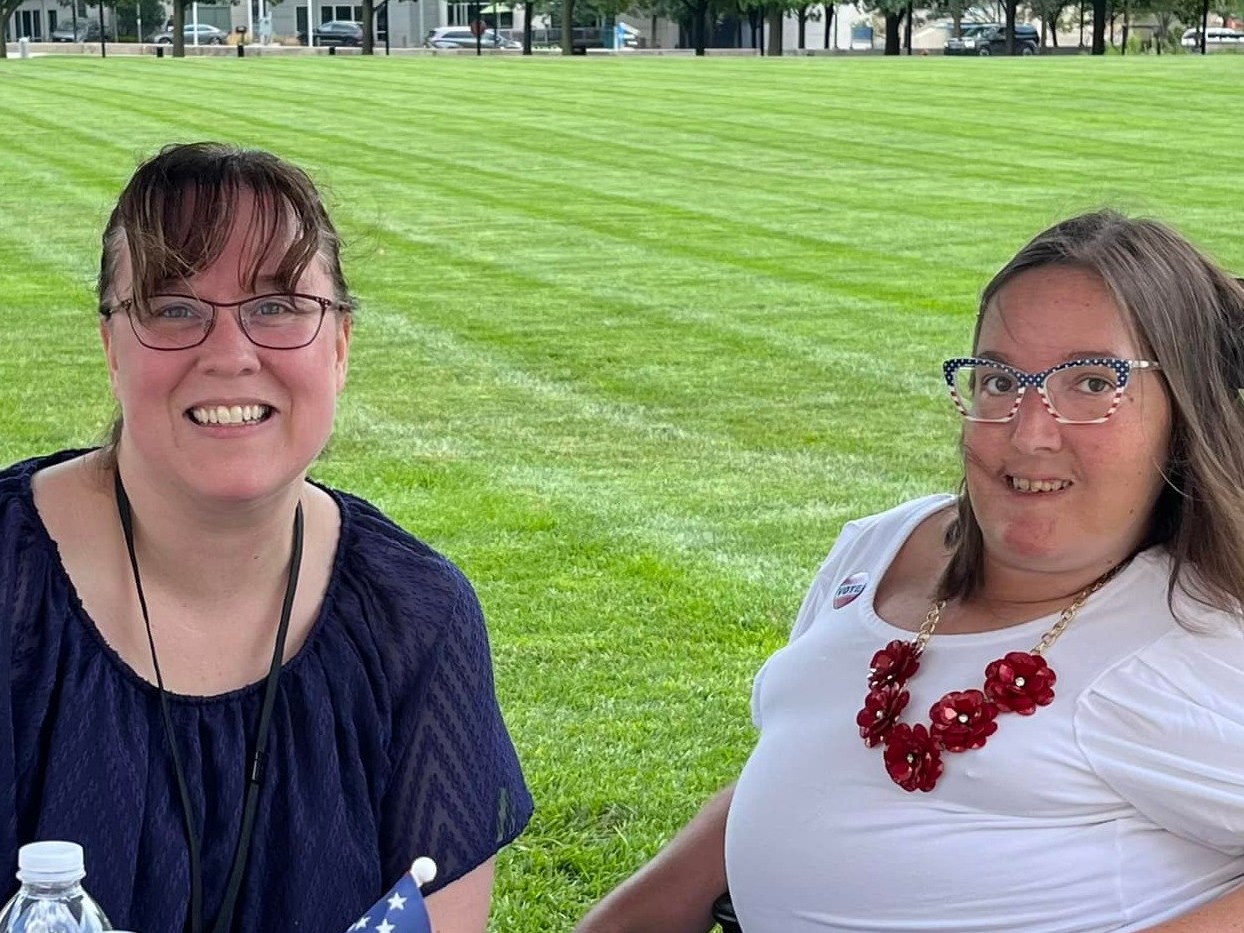 Michelle Wickham & Emily Munson at Disability Caravan. Michelle Wickham & Emily Munson at Disability Caravan.
| 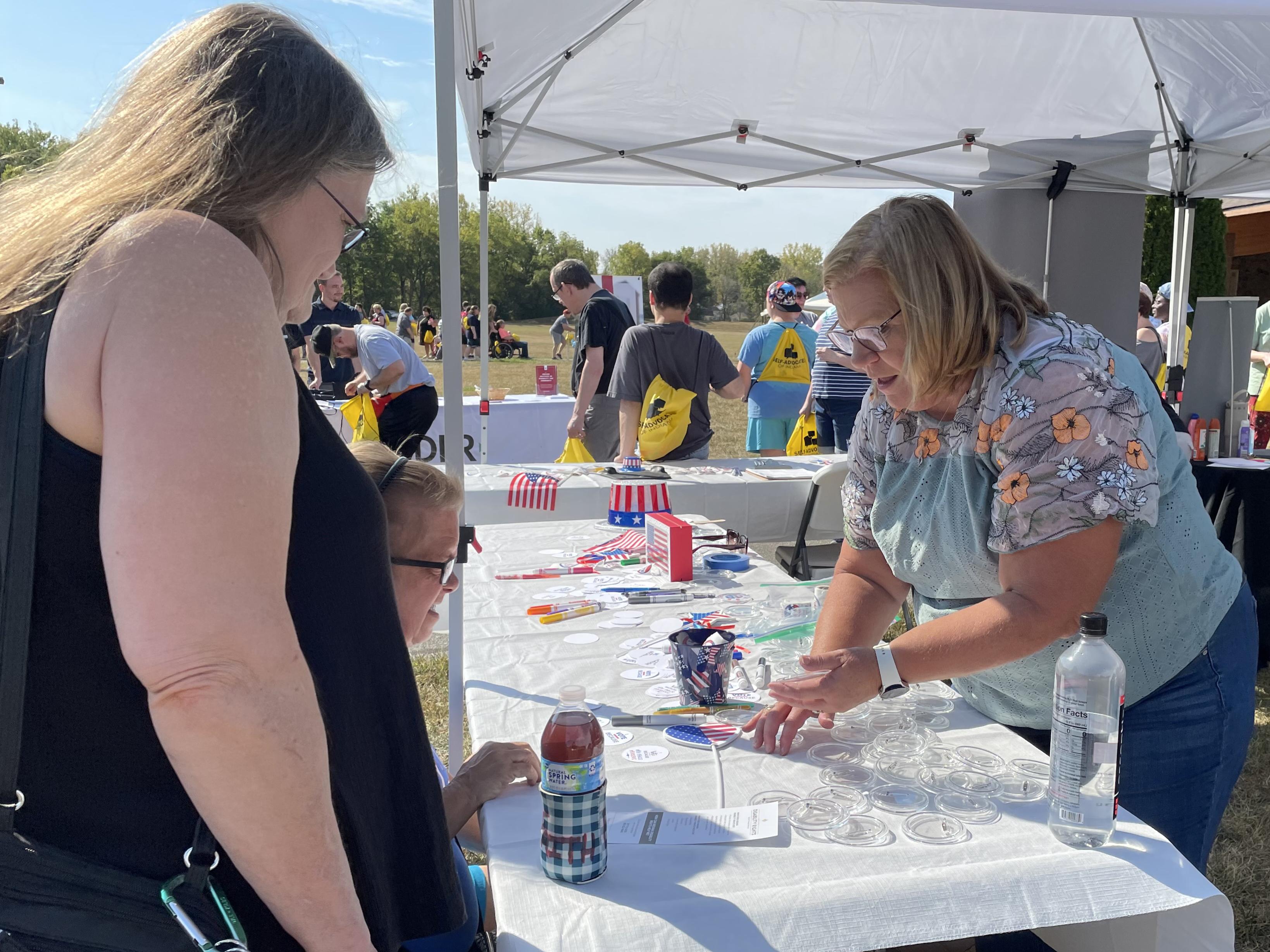 Tina Frayer and self-advocates talk crafts at the SAI Picnic. Tina Frayer and self-advocates talk crafts at the SAI Picnic.
| 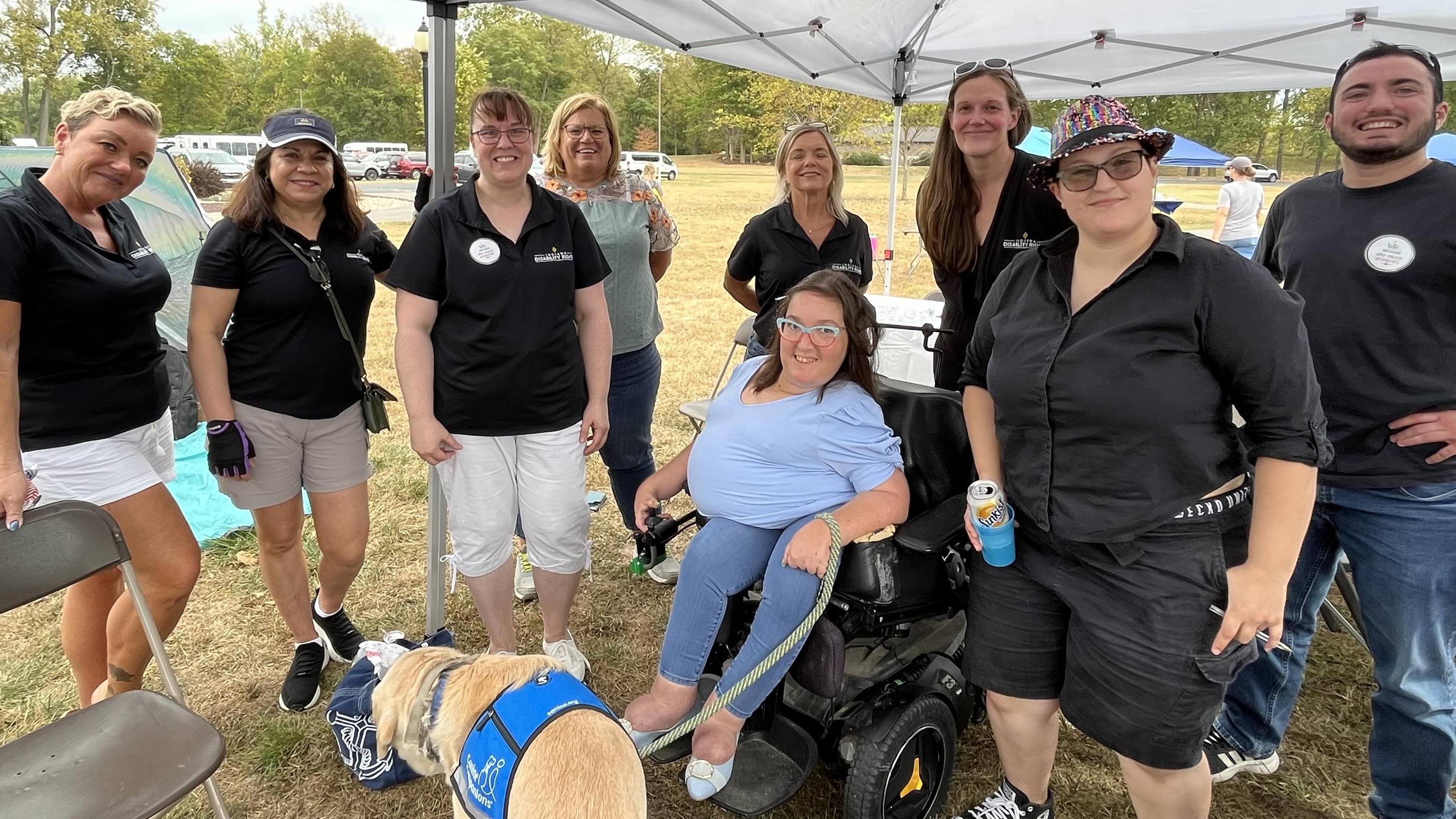 Staff gather in the shade of the IDR booth, ready to assist attendees at the SAI
Picnic. Staff gather in the shade of the IDR booth, ready to assist attendees at the SAI
Picnic.
|
- Emily Munson and Michelle Wickham represented IDR at an event featuring the Disability Caravan. They shared voter registration materials and information about IDR services.
- Melissa Keyes, Emily Munson, Tash Crespo, Michelle Wickham, John Heinz, Carmen Ledezma, Tina Frayer, and Amy Jarrett attended the annual SAI Picnic. During this event, IDR staff:
- helped ten attendees register to vote or update their registration;
- gave seven voter registration forms to an individual for all his household members, who are not yet registered to vote;
- assisted one person to fill out a Health Care Representative form, and gave information to ten others interested in Advanced Directives;
- shared 30 print resources;
- enjoyed visiting attendees, who created 75 voting-themed buttons and decorated 75 paper fans.
| Voting-Related Webpage Performance FY 2024 | Q1 | Q2 | Q3 | Q4 | Totals |
|---|---|---|---|---|---|
| % of Website Visits to Voting-Related Webpage | 70% | 49% | 60% | 80% | 65% |
| Page Views of Voting-Related Webpages | 34,067 | 15,935 | 26,668 | 95,767 | 172,437 |
Education & Outreach
- Presentations – Presentation topics are noted throughout this report.
- Events - Employees represented IDR at 5 events this quarter, focused on voting, education, and disability awareness.
- Informational Resources Distributed
- 302 print resources this quarter
- 2,637 digital resource downloads from IDR's website this quarter
Figure 20 - Graph of File Downloads by Website Visitors in FY 2024
- Press
- The media contacted IDR 11 times this quarter.
- IDR cases and staff were featured in 7 news stories, where were published in 9 outlets this quarter.
- Social Media
- Facebook followers: 3,882
- Instagram followers: 1,410
- X (formerly Twitter) followers: 1,203
- Social Media Performance FY 2024
- IDR Website Data FY 2024
| Presentations FY 2024 | Q1 | Q2 | Q3 | Q4 | Total |
|---|---|---|---|---|---|
| Total Presentations | 2 | 6 | 9 | 8 | 25 |
| Total Attendees | 32 | 468 | 390 | 289 | 1,179 |
Figure 19 - Presentations FY 2024
| Platform | Q1, # posts, reach | Q2, # posts, reach | Q3, # posts, reach | Q4, # posts, reach | FY 2024 Totals |
|---|---|---|---|---|---|
| 6 posts, 3,116 views | 4 posts 5,043 views | 5 posts 6,654 views | 17 posts 4,965 views | 32 posts 19,778 views | |
| 3 posts 572 views | 3 posts 673 views | 5 posts 1,122 views | 14 posts 1,243 views | 25 posts 3,610 views | |
| 5 posts 729 views | 4 posts 327 views | 5 posts 211 views | 13 posts 676 views | 27 posts 1943 views |
Figure 21 - Social Media Performance FY 2024
Figure 22 - Post Views by Platform FY 2024, Quarter 4
| Analytic | Q1 | Q2 | Q3 | Q4 | Year Total |
|---|---|---|---|---|---|
| Page Views | 48,800 | 32,500 | 44,300 | 119,000 | 244,600 |
| Sessions | 37,200 | 21,600 | 32,600 | 88,400 | 179,800 |
| Active Users | 30,600 | 17,400 | 26,300 | 73,600 | 147,900 |
| File Downloads | 1,371 | 1,486 | 1,498 | 2,637 | 6,992 |
Figure 24 - Graph of IDR Webpage Views FY 2024
Supplemental Information
IDR Staff
Current Grant Programs
- CAP – Client Assistance Program
- PAAT – Protection & Advocacy for Obtaining Assistive Technology
- PABSS – Protection & Advocacy for Beneficiaries of Social Security
- PADD – Protection & Advocacy for Persons with Developmental Disabilities
- PAIMI – Protection & Advocacy for Individuals with Mental Illness
- PAIR - Protection & Advocacy for Individual Rights
- PATBI - Protection & Advocacy for Persons with Traumatic Brain Injury
- PAVA - Protection & Advocacy for Voting Access
State Hospitals
- LCH – Larue Carter Hospital
- LSH – Logansport State Hospital
- EPCC – Evansville Psychiatric Children’s Center
- ESH – Evansville State Hospital
- MSH – Madison State Hospital
- RSH – Richmond State Hospital
